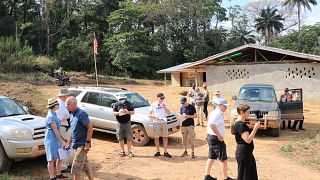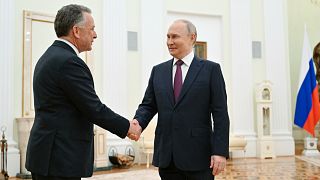War crimes
The trial of a suspected warlord accused of atrocities during Liberia's civil war begins in Finland on Wednesday, the first such case to be partly heard on Liberian soil.
Gibril Massaquoi, a Sierra Leonean living in Finland since 2008, is accused of murder, aggravated war crimes and aggravated crimes against humanity during the West African country's internal conflict a generation ago.
The 51-year-old -- who denies the charges -- was allegedly known by the moniker "Angel Gabriel" and will appear before Pirkanmaa District Court in Tampere, the Finnish town where he was arrested in March last year.
In a historic first, the court will also move to Liberia and neighbouring Sierra Leone in mid-February to hear testimony from up to 80 witnesses and visit sites where the atrocities are alleged to have been carried out under Massaquoi's orders.
Prosecutors have demanded a life sentence for a grisly litany of killings, rapes and torture they say were carried out by Massaquoi and soldiers under his command between 1999 and 2003.
Life sentences in Finland mean on average 14 years imprisonment, with prisoners released after a safety review.
Court documents contend he held an "extremely senior and influential position" in the RUF, one of the main militias fighting alongside president Charles Taylor's NPFL forces.
Finnish law can allow for the prosecution of serious crimes committed abroad.
- 'Groundbreaking' trial -
In the northern village of Kamatahun Hassala, witnesses say that Massaquoi ordered civilians, including children, to be locked into two buildings which were burnt to the ground.
At least seven women were raped and murdered in the same village, while other locals were killed, their bodies cut up and "made into food which Massaquoi also ate," according to the court documents.
The 4,000-page evidence dossier further details mass murders and rapes in Lofa county and the capital Monrovia, and accuses Massaquoi of enslavement and using child soldiers.
The crimes "deliberately and systematically" violated international humanitarian law, and inflicted "irreparable emotional suffering and damage" on the families of his many victims, prosecutors wrote.
News that the court will sit in Liberia has been welcomed in the country whose back-to-back civil wars between 1989 and 2003 left 250,000 people dead and millions displaced.
"This is a good step taken by the international community. It is a signal that crimes committed during the civil war will not go unpunished," human rights activist Adama Dempster told AFP in Monrovia.
Civitas Maxima, the rights group whose initial investigation into Massaquoi prompted the Finnish police to act, said the "groundbreaking" decision could set "a monumental precedent in the ongoing struggle for accountability for the world's worst atrocities."
So far only a handful of people have been convicted for their part in the conflict.
Former Liberian warlord-turned-president Charles Taylor was imprisoned in 2012 -- but for war crimes committed in neighbouring Sierra Leone, not in his own country.
- 'Nothing left behind' -
Meanwhile prosecutions are currently underway against alleged warlords Alieu Kosia in Switzerland and Kunti Kamara in France.
"I welcome the trial and it's our prayers that the court opens in Liberia," survivor Alexander Fayiah told AFP.
Now 42, Fayiah said he was 12 when RUF fighters stormed his village of Foyah in Lofa county, and his mother managed to smuggle him away to safety.
"When they left, there was nothing left behind. Houses were burnt, women were raped and kids were taken hostage to become child soldiers," Fayiah said.
Efforts to establish a war crimes court in the country have stalled.
"The sad news is that those who committed those crimes are the ones who have the political power," Dempster said.
Massaquoi insists he was involved in peace negotiations elsewhere in the region at the time of the atrocities.
"He denies all of the charges... he wasn't there" Massaquoi's lawyer, Kaarle Gummerus, told AFP.
The one-time teacher was allowed to relocate to Finland in return for giving evidence to the UN-led Special Court for Sierra Leone in 2003, set up to examine that country's civil war.
Massaquoi received immunity from prosecution over acts committed in Sierra Leone, but not in Liberia.
Judges at Pirkanmaa district court expect to return to Finland in May for a further two months of hearings, with a verdict delivered in September.











Go to video
Sudan: Rapid Support Forces attack in western Darfur kills at least 30, according to activist group
Go to video
DRC: Goma Christians celebrate Easter under rebel rule
Go to video
Congo suspends Kabila's political party over rebel 'ties'
01:06
Sudan: Thousands flee, more remain trapped in RSF attack on Darfur camp
Go to video
South Sudan: top UN official in the country warns of risk of new civil war
Go to video
Sudan: Rapid Support Forces leader announces rival government